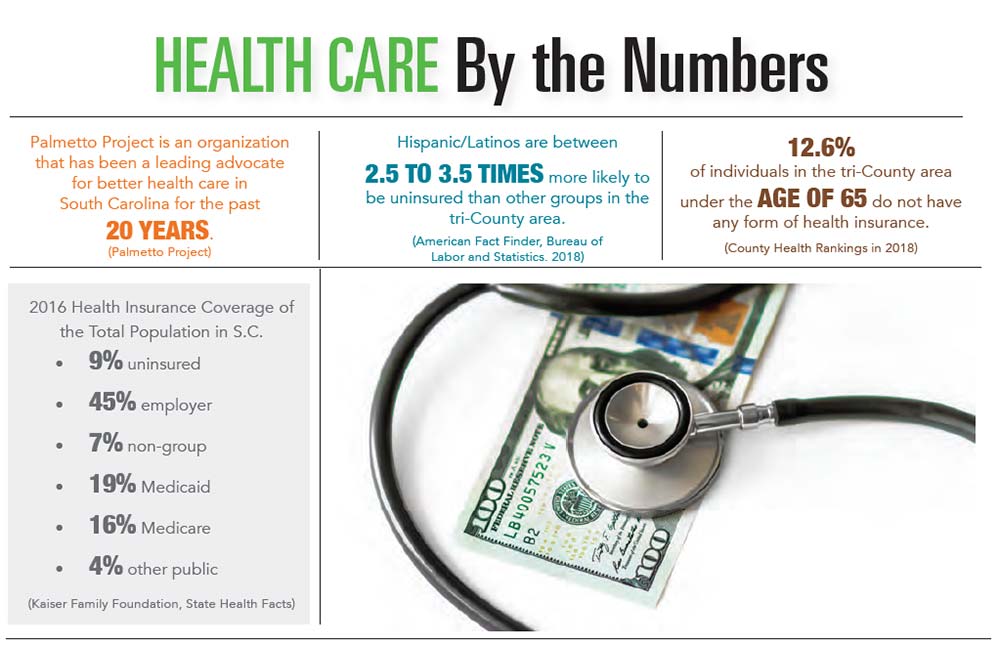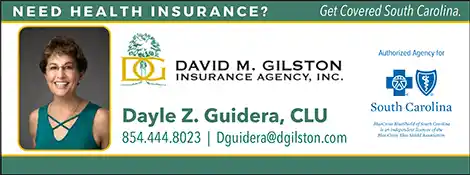The cost of health care in the Lowcountry and across the United States continues to rise, taking a substantial bite out of the financial well-being of millions of Americans, forcing many of them to make critical, possibly life-changing decisions about where they will spend their hard-earned money.
Is it worth it to continue to pay ever-increasing health insurance premiums, or would it be better to simply deal with the risk of a financially debilitating illness or injury? Is it prudent to forgo necessary medical care because you feel the need to spend your income in other ways?
These decisions are especially pressing for low-income families and senior citizens surviving on a fixed income. For instance, a recent survey conducted by Wakefield Research for Clover Health found that 17 percent of Charleston-area residents over the age of 60 have decided against care they considered to be necessary. Thirty-four percent of them said cost was the reason they chose not to see a medical professional.
“It is very concerning that 17 percent of Charleston seniors reported not seeking medical care even when they felt they needed a doctor’s attention,” said Dr. Kumar Dharmarajan, Clover’s chief scientific officer. “Older adults are particularly vulnerable to complications from chronic conditions and illnesses like the flu, making it crucial that they get the care they need.”
Fortunately, there are options for low-income families and senior citizens, including Medicaid; Federally Qualified Health Centers such as the Fetter Health Care Network; free medical clinics; and Medicare Advantage plans that offer services that aren’t covered by the traditional Medicare program.
As of 2017, the federal and state Medicaid program was providing free health insurance to 74 million low-income and disabled Americans of all ages. All states have participated in the program since 1982; in South Carolina, it is known as Healthy Connections and is administered by the Department of Health and Human Services. Palmetto State residents have had the option of Medicaid since 1968, but South Carolina lawmakers chose not to expand the program when the Affordable Care Act was passed by Congress and signed into law by President Barack Obama in March 2010.
For children in families that earn too much money to qualify for Medicaid, the Children’s Health Insurance Program (CHIP) provides low-cost health coverage for routine check-ups; immunizations; doctor visits; prescriptions; dental and vision care; inpatient and outpatient hospital care; lab and X-ray services; and emergency services.
According to Medicaid.gov, 1,021,579 South Carolinians were enrolled in Medicaid and CHIP as of December 2018.
Medicaid is serving an important role, mostly for children, pregnant women and the elderly, according to Dr Sharvette Slaughter, chief medical officer at Fetter Health Care in Charleston. She added that Fetter, in its role as an FQHC, is also helping low-income families get the health-care services they need.
Established as a nonprofit organization in 1967, Fetter serves families of all demographics at nine locations in Charleston, Berkeley, Dorchester and Colleton counties. Dr. Slaughter pointed out that Fetter is not a free clinic. Private insurance, Medicare, Medicaid and all other insurance plans are accepted, and patients are charged based on a sliding fee scale.
“If a person can’t pay, it’s essentially free care. All services are based on income,” she said. “We don’t turn anyone away. It’s not free for all, but it’s affordable.”
Fetter even serves the medical needs of migrant and seasonal workers and their children in camps on Johns Island, in Wadmalaw and in other locations in the Lowcountry.
The organization receives funding from the federal government, as well as other grants that support its programs. For example, a mobile dental van, offering screenings, X-rays, treatment plans and extractions, started offering services to area residents in February. The van spent a week at a school in Hollywood, taking care of the dental needs of students, parents and school employees.
Fetter also connects patients with services such as referrals to medical specialists and housing opportunities, and its Choose Well program provides contraceptive care to women at no charge.
In Dr. Slaughter’s mind, access to health care is just as important as affordability. That’s why the dental van is out in the community, and that’s why Fetter sends a nurse practitioner to One80 Place, the homeless shelter on Walnut Street in Charleston, two days a week.
“Sometimes you have to go to where the people are to make sure they have access to care,” Dr. Slaughter said. “Not everyone can get to you.”
In its efforts to provide a medical home for low-income families – and help them avoid expensive visits to local hospital emergency rooms – Fetter is marketing its services at health fairs, churches, schools and homeless shelters, as well as on billboards and Charleston Area Regional Transportation Authority buses.
“It’s all about communication and marketing,” Dr. Slaughter said. “We have to let people know who we are.”
“We need to think of a way to expand services and programs to everyone who needs them,” she added. “But people also need to be held accountable and to be responsible citizens.”
Low-income families need help finding the best way to spend their health-care dollars, and many senior citizens face the same problems. According to Dr. Dharmarajan, they should deal with this problem in three ways: accessing preventive care benefits; utilizing all resources that are available to them; and considering Medicare Advantage options instead of traditional Medicare coverage.
Dr. Dharmarajan pointed out that preventive care is covered by most insurance plans. For example, Medicare pays for an annual wellness visit to the doctor’s office. He added that for various reasons, many people don’t apply for programs for which they are eligible. He pointed out that there are organizations, including those that partner with Clover Health, that will help people complete the paperwork necessary to access these programs.
“You need to take advantage of these resources. You have to apply for them. It’s a process, and it can be challenging to produce all the data that is required,” he said.
Dr. Dharmarajan added that senior citizens should take a serious look at Medicare Advantage plans. Some of them offer insurance that isn’t available through Medicare, such as dental and vision coverage and gym memberships.
“You should look at specific plans to decide if they are the right fit for you,” he said. “You should shop around.”
Free Medical Clinics in the Lowcountry
3226 Maybank Highway, Building C
Johns Island, S.C. 29455
843-266-9800
www.bifmc.orgHarvest Free Medical Clinic
1670 Drydock Ave., Building 10
North Charleston, S.C. 29405
843-747-3526
www.hfmc.org
Dream Center Clinic – North Campus
5505 N. Rhett Ave.
North Charleston, S.C. 29405
843-225-1115
www.dreamcenterclinic.org
2049 Savannah Highway
Charleston, S.C. 29407
843-375-1089
www.dreamcenterclinic.orgShifa Clinic
1092 Johnnie Dodds Blvd.
Mount Pleasant, S.C. 29464
843-352-4580
shifaclinics.com
One80 Place
35 Walnut St.
Charleston, S.C. 29403
843-723-9477
one80place.org
By Brian Sherman









